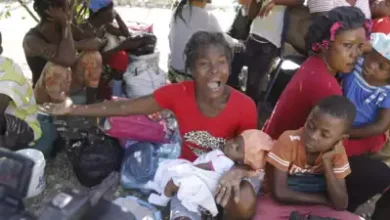How an Israeli nurse helped elderly hostages during her captivity in Gaza
A nurse who was among the many Israelis kidnapped and taken to Gaza claims that she treated her elderly captors—some of them were blind or deaf—with sparse medical supplies that she had to bargain with Hamas for during her incarceration in an underground tunnel.

During an Israeli-Hamas ceasefire in November, Nili Margalit was returned home. In an interview with local television, she said that she was taken from her village by Palestinian civilians who then “sold” her to the Islamist militants who spearheaded the October 7 attack that started a conflict.
Margalit, 41, claims she was carried barefoot into a stuffy tunnel in Hamas without knowing that her father and over 1,200 other people had been slaughtered. There, captives had been picked up and their ailments varied from bruises to broken bones from their severe treatment.
She said, “We were in a state of shock,” on the current affairs show Uvda on Channel 12 TV.
Margalit, however, told her captors in Hamas that she was a nurse by using some rudimentary Arabic that she had acquired in the emergency department of a southern Israeli hospital that treats Bedouin patients. Her offer to oversee the captives’ medical needs was accepted.
She stated, “I was concerned about the older ones.” “I asked them to list their important medications – for heart conditions, blood pressure, kidneys.” Margalit transcribed them for Hamas in English. A few days later, a black bag with pharmacy goods came, but it was insufficient and some of the prescriptions didn’t match.
“People were ill. Their ailments were persistent,” she said. It was lacking in pillage. The meal was insufficient.
But the privation provided band-aid solutions. Those with untreated diabetes who were on the verge of hunger were spared hyperglycemia. Presented with a single antibiotic strip, Margalit chose to preserve it by applying honey to a lesion in order to reduce inflammation.
Regular negotiations with Hamas captors, some of whom she described as high Palestinian officials who would check the prisoners and speak Hebrew, were necessary to get fresh supplies.
She stated, “I bugged them, doing it with what you might call a bit of good grace,” remembering that she had alerted the captors to the possibility that some of the captives may pass away from their ailments. “They were scared by it. They desired that these individuals not perish.”
As part of an agreement in which Israel released a large number of Palestinian captives, Margalit and many elderly female hostages were released as well. There are still 132 captives in Gaza, 25 of them are elderly men, according to Israeli authorities. In addition to claiming that some of them were murdered by shelling of Gaza, Hamas threatened to execute captives early in the conflict.
According to Margalit, medical supplies have probably ran out by now. “We know that we were in tunnels, and we know that the war is currently being fought above where we were held,” she said.
Yarden Bibas, who was taken prisoner apart from his spouse Shiri and their two small children, Ariel and Kfir, was one of Margalit’s fellow captives. Margalit said that the Palestinian kidnappers misled him into believing that his wife and boys had been observed returning to Israel because of his extreme distress over his family’s situation.
Then Hamas used a different approach, informing Bibas that Shiri, Ariel, and Kfir had perished in an Israeli airstrike in Gaza and filming his horrified reaction for public consumption.
According to Margalit, the hostages were punished by their kidnappers by having less hours of light in their subterranean cells or by not allowing them to utilize ventilation fans when they were irritated.
She was given permission to view some TV news after 40 days of imprisonment, and she would yell the news into the ears of the elderly hostages who were unable to understand it since they had been taken prisoner without eyeglasses or hearing aids.
“We began to feel that Israel had forsaken us, again” after failing to stop the bombardment on October 7, Margalit said, blaming Israel’s Gaza war for the shortage of food and medicine.
At her request, Hamas provided tranquilizers and sleeping drugs to relieve the prisoners’ insomnia and exhaustion.
“I wanted to become tranquil. It was something I want for myself. I was afraid I would lose my mind at any time,” she said.







